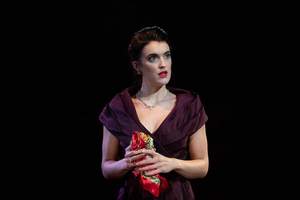Review: OPERA UNDONE: TOSCA & LA BOHEME, Trafalgar Studios

In yet another attempt to democratise opera, Opera Undone, the new strand of Islington's King's Head Theatre's celebrated opera offering, brings two radical interpretations of Puccini's Tosca and La bohème to the Trafalgar Studios. These are also the first productions to debut in the West End.
Relevance is incredibly important in gaining new audiences for opera; elitism unfortunately remains and with tickets for the Royal Opera House's upcoming production of Fidelio trading for thousands of pounds, prohibitive costs do so as well. Director Adam Spreadbury-Maher has consistently tried to make his opera productions as accessible as possible, both in terms of comprehension and much lower ticket prices.
These new adaptations will not appeal to purists; both are compressed into sixty minutes, sung in English and are altered hugely in terms of characters, themes and settings. Musical Director David Eaton has stripped Puccini's scores to be played with just a piano. This varies in success, leaving the cast with nowhere to hide and inevitably reducing the impact and emotional swell of both operas.
Spreadbury-Maher has wide experience with both operas; in 2012 he set Tosca (**) in Communist East Berlin; in 2017, it was in occupied Paris. In this production, the action is set in 1940s Manhattan; Scarpia is a villainous Mafia boss who targets the relationship between the beautiful Tosca and artist Cavaradossi, known as Mario.
In a rotating cast, Fiona Finsbury sang Tosca on press night. She is the standout performer, with both power and passion in her voice. She has a clear and sharp soprano and is a good actress, but doesn't really have the time to display all the conflicting behaviours of the character of coquettish flirtation, abject jealousy and obsessive love.
Traditionally Tosca runs for over three hours, so cutting it down by two thirds will inevitably lose some musical gems. Finsbury's lovely rendition of the adaptation of the famous "Vissi D'Arte" was welcome to those missing much of the score.
Unfortunately, Roger Paterson is a rather bland Cavaradossi; there is little chemistry between him and Finsbury, so it is hard to be convinced of their relationship. Finsbury's voice overwhelms his during their duets and Paterson seemed to strain on certain notes; lacking projection and power. Perhaps the winter weather is taking its toll?
Hugo Herman Wilson's Scarpia also suffers from a slightly cracked voice, but his baritone is melodious and has good projection. He lacks some of the odious lasciviousness necessary for the role, but is certainly predatory at points. Philip Lee makes a brutish but almost silent Spoletta.
As a story of manipulation, a power struggle between the sexes and one of the most tragic endings in opera, this part of the production suffers from its somewhat brutal editing.
The compression of La bohème (****) is much more successful. Spreadbury-Maher had to come up with something radical to rival his other Olivier award-nominated version of this opera and he has certainly done that.
Set in present-day London, Mimì is now Luca and in a gay relationship with Rod (Rodolfo). Marcello is now Marcus and is exploring a polyamorous relationship with Melissa, formerly known as Musetta. Grindr, drug addiction and chemsex are all referenced. The poverty-stricken lives of the friends are absent, but the wide range of emotions is still very much in evidence.
Roberto Barbaro is an excellent Rod; he has an expressive voice, filling the space with his warm tenor. The change of Mimì into a tenor role from a soprano is interesting and, overall, successful. Where some musicality is lost is the adaptation of the famous love duet "O Soave Fanciulla", which loses some impact due to the lack of the soprano, not sentiment.
Philip Lee is an interesting Mimì, a drug addict and party-boy, with a voice full of feeling. There is a great chemistry between him and Barbaro, with a very believable relationship and its rollercoaster of emotions.
Michael Georgiou is a warm and convincing Marcus, with a teasing rapport with Honey Rouhani, who is a brilliant Melissa. She captures all the flirtation and outrageous behaviour of the character. Her soprano is also a welcome addition to the other male voices.
The cast are all good actors; vital in this opera above many others. Rouhani in particular is captivating. The production is also very funny, not something you can normally associate with this opera. The editing is clever, with the essential themes of love, jealousy and fidelity retained. What suffers is the ending, which feels rushed and therefore loses some emotional heft.
The evening is very much of two halves, with an empty-feeling Tosca contrasting with a radically new and contemporary La bohème. Don't see these performances expecting the greatest operatic performances, but do come to experience opera in a highly innovative, accessible and entertaining format. It's what Adam Spreadbury-Maher does best.
Opera Undone: Tosca & La bohème is at the Trafalgar Studios until 7 March
Photo Credit: Ali Wright
Reader Reviews

Videos
